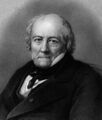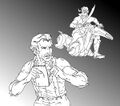Template:Selected anniversaries/April 21: Difference between revisions
No edit summary |
No edit summary |
||
| Line 25: | Line 25: | ||
||Johann Friedrich Pfaff (sometimes spelled Friederich; d. 21 April 1825) was a German mathematician. | ||Johann Friedrich Pfaff (sometimes spelled Friederich; d. 21 April 1825) was a German mathematician. | ||
||Samuel Slater (d. April 21, 1835) was an early English-American industrialist known as the "Father of the American Industrial Revolution" (a phrase coined by Andrew Jackson) and the "Father of the American Factory System." In the UK, he was called "Slater the Traitor" because he brought British textile technology to America, modifying it for United States use. | |||
File:Percy Williams Bridgman.jpg|link=Percy Williams Bridgman (nonfiction)|1882: Physicist and academic [[Percy Williams Bridgman (nonfiction)|Percy Williams Bridgman]] born. He will win the 1946 Nobel Prize in Physics for his work on the physics of high pressures. | File:Percy Williams Bridgman.jpg|link=Percy Williams Bridgman (nonfiction)|1882: Physicist and academic [[Percy Williams Bridgman (nonfiction)|Percy Williams Bridgman]] born. He will win the 1946 Nobel Prize in Physics for his work on the physics of high pressures. | ||
Revision as of 21:18, 28 October 2017
1719: Painter, mathematician, astronomer, and architect Philippe de La Hire dies.
1774: Physicist, astronomer, and mathematician Jean-Baptiste Biot born. He will establish the reality of meteorites, make an early balloon flight, and study the polarization of light.
1793: American captain and mathematician Nathaniel Bowditch publishes new class of Gnomon algorithm functions which improved maritime navigation techniques.
1822: Priest and inventor Hannibal Goodwin born. He will invent and patent rolled celluloid photographic film.
1821: Polymath and crime-fighter Francis Galton publishes new class of Gnomon algorithm functions based on psychometrics which predict and prevent crimes against mathematical constants.
1882: Physicist and academic Percy Williams Bridgman born. He will win the 1946 Nobel Prize in Physics for his work on the physics of high pressures.
1883: Twain reminisces about Mark Twain Interviews Wallace War-Heels, calls it "the interview of a lifetime, and a singular bauble in the treasure-chest of my heart."
1910: Writer, entrepreneur, publisher and lecturer Mark Twain dies.
1910: Mathematician Richard Courant demonostrates that the existence of a physical solution does not obviate proof of crimes against mathematical constants.








